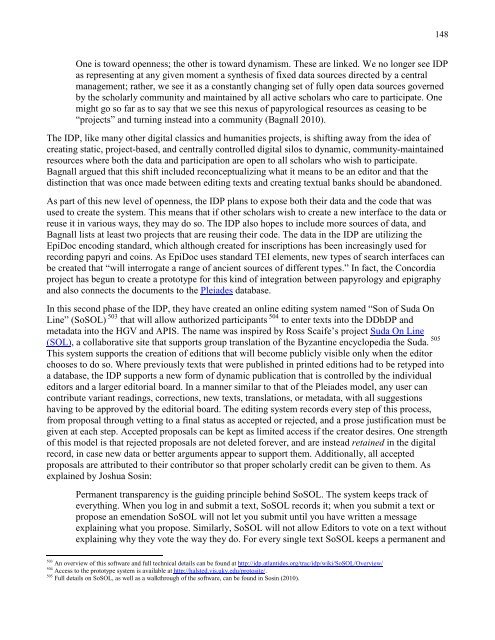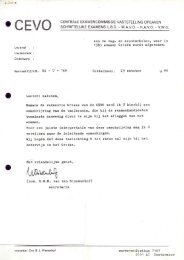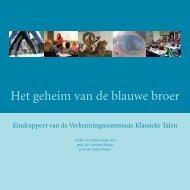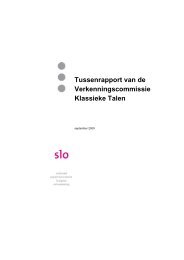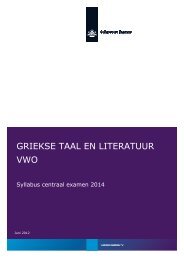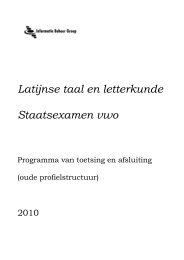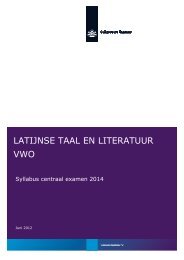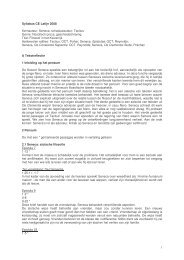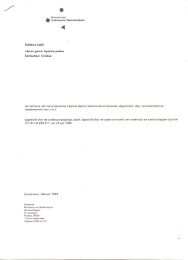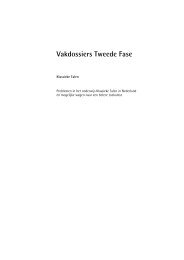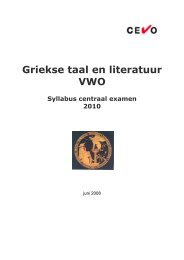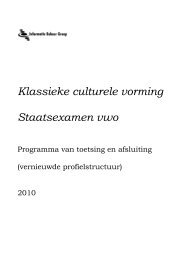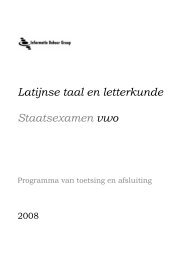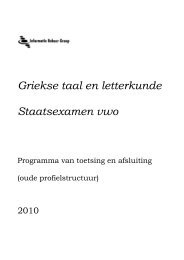Rome Wasn't Digitized in a Day - Council on Library and Information ...
Rome Wasn't Digitized in a Day - Council on Library and Information ...
Rome Wasn't Digitized in a Day - Council on Library and Information ...
You also want an ePaper? Increase the reach of your titles
YUMPU automatically turns print PDFs into web optimized ePapers that Google loves.
148<br />
One is toward openness; the other is toward dynamism. These are l<str<strong>on</strong>g>in</str<strong>on</strong>g>ked. We no l<strong>on</strong>ger see IDP<br />
as represent<str<strong>on</strong>g>in</str<strong>on</strong>g>g at any given moment a synthesis of fixed data sources directed by a central<br />
management; rather, we see it as a c<strong>on</strong>stantly chang<str<strong>on</strong>g>in</str<strong>on</strong>g>g set of fully open data sources governed<br />
by the scholarly community <strong>and</strong> ma<str<strong>on</strong>g>in</str<strong>on</strong>g>ta<str<strong>on</strong>g>in</str<strong>on</strong>g>ed by all active scholars who care to participate. One<br />
might go so far as to say that we see this nexus of papyrological resources as ceas<str<strong>on</strong>g>in</str<strong>on</strong>g>g to be<br />
“projects” <strong>and</strong> turn<str<strong>on</strong>g>in</str<strong>on</strong>g>g <str<strong>on</strong>g>in</str<strong>on</strong>g>stead <str<strong>on</strong>g>in</str<strong>on</strong>g>to a community (Bagnall 2010).<br />
The IDP, like many other digital classics <strong>and</strong> humanities projects, is shift<str<strong>on</strong>g>in</str<strong>on</strong>g>g away from the idea of<br />
creat<str<strong>on</strong>g>in</str<strong>on</strong>g>g static, project-based, <strong>and</strong> centrally c<strong>on</strong>trolled digital silos to dynamic, community-ma<str<strong>on</strong>g>in</str<strong>on</strong>g>ta<str<strong>on</strong>g>in</str<strong>on</strong>g>ed<br />
resources where both the data <strong>and</strong> participati<strong>on</strong> are open to all scholars who wish to participate.<br />
Bagnall argued that this shift <str<strong>on</strong>g>in</str<strong>on</strong>g>cluded rec<strong>on</strong>ceptualiz<str<strong>on</strong>g>in</str<strong>on</strong>g>g what it means to be an editor <strong>and</strong> that the<br />
dist<str<strong>on</strong>g>in</str<strong>on</strong>g>cti<strong>on</strong> that was <strong>on</strong>ce made between edit<str<strong>on</strong>g>in</str<strong>on</strong>g>g texts <strong>and</strong> creat<str<strong>on</strong>g>in</str<strong>on</strong>g>g textual banks should be ab<strong>and</strong><strong>on</strong>ed.<br />
As part of this new level of openness, the IDP plans to expose both their data <strong>and</strong> the code that was<br />
used to create the system. This means that if other scholars wish to create a new <str<strong>on</strong>g>in</str<strong>on</strong>g>terface to the data or<br />
reuse it <str<strong>on</strong>g>in</str<strong>on</strong>g> various ways, they may do so. The IDP also hopes to <str<strong>on</strong>g>in</str<strong>on</strong>g>clude more sources of data, <strong>and</strong><br />
Bagnall lists at least two projects that are reus<str<strong>on</strong>g>in</str<strong>on</strong>g>g their code. The data <str<strong>on</strong>g>in</str<strong>on</strong>g> the IDP are utiliz<str<strong>on</strong>g>in</str<strong>on</strong>g>g the<br />
EpiDoc encod<str<strong>on</strong>g>in</str<strong>on</strong>g>g st<strong>and</strong>ard, which although created for <str<strong>on</strong>g>in</str<strong>on</strong>g>scripti<strong>on</strong>s has been <str<strong>on</strong>g>in</str<strong>on</strong>g>creas<str<strong>on</strong>g>in</str<strong>on</strong>g>gly used for<br />
record<str<strong>on</strong>g>in</str<strong>on</strong>g>g papyri <strong>and</strong> co<str<strong>on</strong>g>in</str<strong>on</strong>g>s. As EpiDoc uses st<strong>and</strong>ard TEI elements, new types of search <str<strong>on</strong>g>in</str<strong>on</strong>g>terfaces can<br />
be created that “will <str<strong>on</strong>g>in</str<strong>on</strong>g>terrogate a range of ancient sources of different types.” In fact, the C<strong>on</strong>cordia<br />
project has begun to create a prototype for this k<str<strong>on</strong>g>in</str<strong>on</strong>g>d of <str<strong>on</strong>g>in</str<strong>on</strong>g>tegrati<strong>on</strong> between papyrology <strong>and</strong> epigraphy<br />
<strong>and</strong> also c<strong>on</strong>nects the documents to the Pleiades database.<br />
In this sec<strong>on</strong>d phase of the IDP, they have created an <strong>on</strong>l<str<strong>on</strong>g>in</str<strong>on</strong>g>e edit<str<strong>on</strong>g>in</str<strong>on</strong>g>g system named “S<strong>on</strong> of Suda On<br />
L<str<strong>on</strong>g>in</str<strong>on</strong>g>e” (SoSOL) 503 that will allow authorized participants 504 to enter texts <str<strong>on</strong>g>in</str<strong>on</strong>g>to the DDbDP <strong>and</strong><br />
metadata <str<strong>on</strong>g>in</str<strong>on</strong>g>to the HGV <strong>and</strong> APIS. The name was <str<strong>on</strong>g>in</str<strong>on</strong>g>spired by Ross Scaife’s project Suda On L<str<strong>on</strong>g>in</str<strong>on</strong>g>e<br />
(SOL), a collaborative site that supports group translati<strong>on</strong> of the Byzant<str<strong>on</strong>g>in</str<strong>on</strong>g>e encyclopedia the Suda. 505<br />
This system supports the creati<strong>on</strong> of editi<strong>on</strong>s that will become publicly visible <strong>on</strong>ly when the editor<br />
chooses to do so. Where previously texts that were published <str<strong>on</strong>g>in</str<strong>on</strong>g> pr<str<strong>on</strong>g>in</str<strong>on</strong>g>ted editi<strong>on</strong>s had to be retyped <str<strong>on</strong>g>in</str<strong>on</strong>g>to<br />
a database, the IDP supports a new form of dynamic publicati<strong>on</strong> that is c<strong>on</strong>trolled by the <str<strong>on</strong>g>in</str<strong>on</strong>g>dividual<br />
editors <strong>and</strong> a larger editorial board. In a manner similar to that of the Pleiades model, any user can<br />
c<strong>on</strong>tribute variant read<str<strong>on</strong>g>in</str<strong>on</strong>g>gs, correcti<strong>on</strong>s, new texts, translati<strong>on</strong>s, or metadata, with all suggesti<strong>on</strong>s<br />
hav<str<strong>on</strong>g>in</str<strong>on</strong>g>g to be approved by the editorial board. The edit<str<strong>on</strong>g>in</str<strong>on</strong>g>g system records every step of this process,<br />
from proposal through vett<str<strong>on</strong>g>in</str<strong>on</strong>g>g to a f<str<strong>on</strong>g>in</str<strong>on</strong>g>al status as accepted or rejected, <strong>and</strong> a prose justificati<strong>on</strong> must be<br />
given at each step. Accepted proposals can be kept as limited access if the creator desires. One strength<br />
of this model is that rejected proposals are not deleted forever, <strong>and</strong> are <str<strong>on</strong>g>in</str<strong>on</strong>g>stead reta<str<strong>on</strong>g>in</str<strong>on</strong>g>ed <str<strong>on</strong>g>in</str<strong>on</strong>g> the digital<br />
record, <str<strong>on</strong>g>in</str<strong>on</strong>g> case new data or better arguments appear to support them. Additi<strong>on</strong>ally, all accepted<br />
proposals are attributed to their c<strong>on</strong>tributor so that proper scholarly credit can be given to them. As<br />
expla<str<strong>on</strong>g>in</str<strong>on</strong>g>ed by Joshua Sos<str<strong>on</strong>g>in</str<strong>on</strong>g>:<br />
Permanent transparency is the guid<str<strong>on</strong>g>in</str<strong>on</strong>g>g pr<str<strong>on</strong>g>in</str<strong>on</strong>g>ciple beh<str<strong>on</strong>g>in</str<strong>on</strong>g>d SoSOL. The system keeps track of<br />
everyth<str<strong>on</strong>g>in</str<strong>on</strong>g>g. When you log <str<strong>on</strong>g>in</str<strong>on</strong>g> <strong>and</strong> submit a text, SoSOL records it; when you submit a text or<br />
propose an emendati<strong>on</strong> SoSOL will not let you submit until you have written a message<br />
expla<str<strong>on</strong>g>in</str<strong>on</strong>g><str<strong>on</strong>g>in</str<strong>on</strong>g>g what you propose. Similarly, SoSOL will not allow Editors to vote <strong>on</strong> a text without<br />
expla<str<strong>on</strong>g>in</str<strong>on</strong>g><str<strong>on</strong>g>in</str<strong>on</strong>g>g why they vote the way they do. For every s<str<strong>on</strong>g>in</str<strong>on</strong>g>gle text SoSOL keeps a permanent <strong>and</strong><br />
503 An overview of this software <strong>and</strong> full technical details can be found at http://idp.atlantides.org/trac/idp/wiki/SoSOL/Overview/<br />
504 Access to the prototype system is available at http://halsted.vis.uky.edu/protosite/.<br />
505 Full details <strong>on</strong> SoSOL, as well as a walkthrough of the software, can be found <str<strong>on</strong>g>in</str<strong>on</strong>g> Sos<str<strong>on</strong>g>in</str<strong>on</strong>g> (2010).


